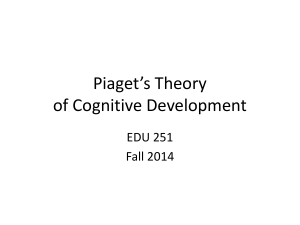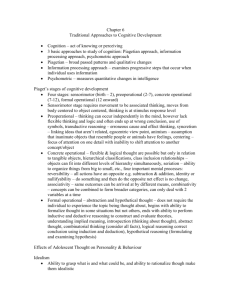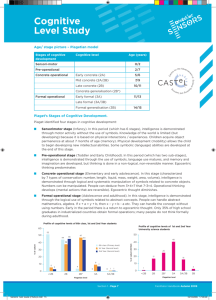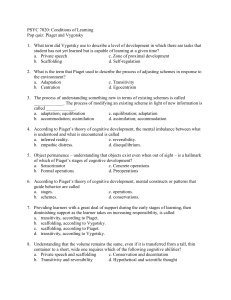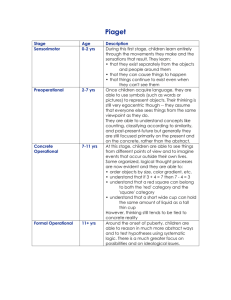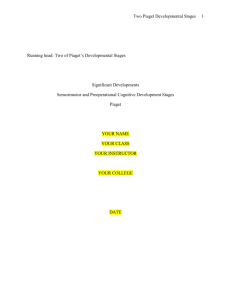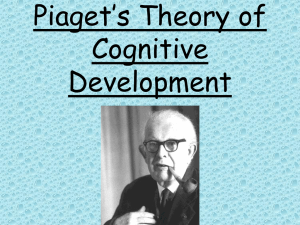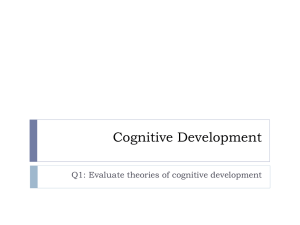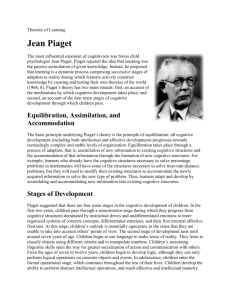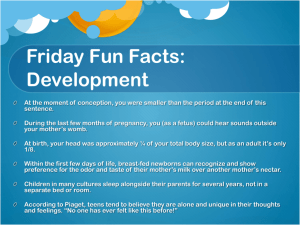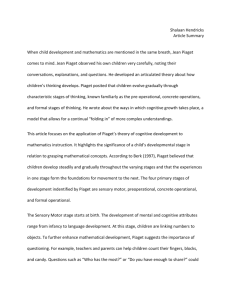06 Piaget I notes - Jeremy Frimer, PhD
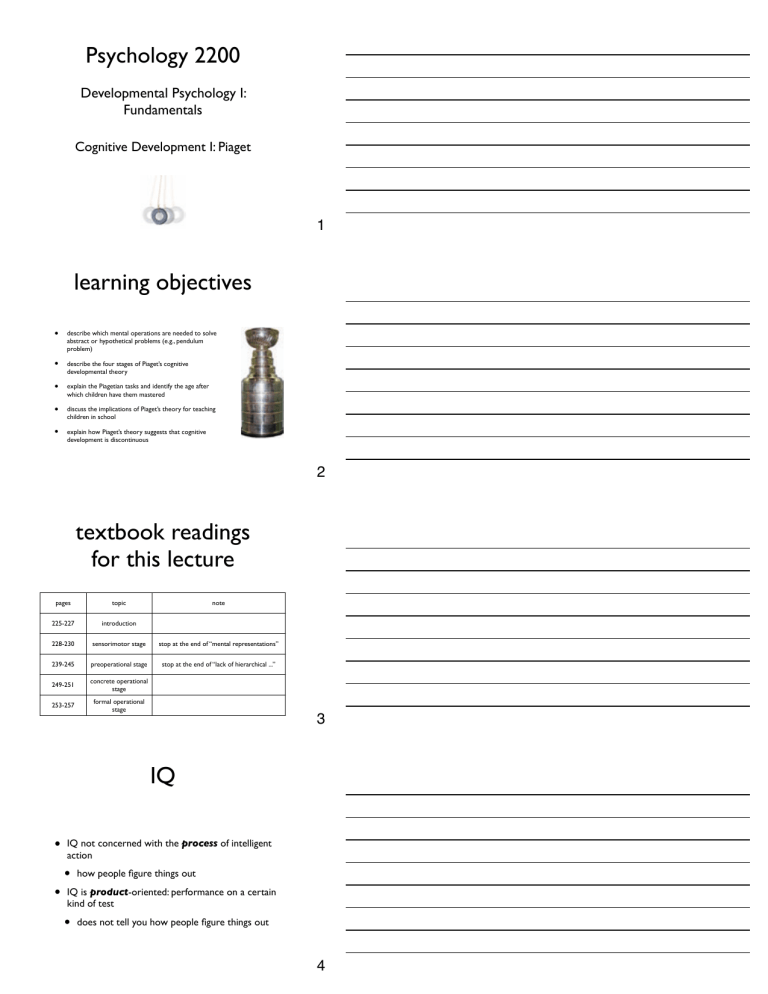
Psychology 2200
Developmental Psychology I:
Fundamentals
Cognitive Development I: Piaget
learning objectives
• describe which mental operations are needed to solve abstract or hypothetical problems (e.g., pendulum problem)
• describe the four stages of Piaget’s cognitive developmental theory
• explain the Piagetian tasks and identify the age after which children have them mastered
• discuss the implications of Piaget’s theory for teaching children in school
• explain how Piaget’s theory suggests that cognitive development is discontinuous
textbook readings for this lecture
pages
225-227
228-230
239-245
249-251
253-257 topic introduction sensorimotor stage note stop at the end of “mental representations” preoperational stage concrete operational stage formal operational stage stop at the end of “lack of hierarchical ...”
3
IQ
2
1
•
IQ not concerned with the process of intelligent action
• how people figure things out
•
IQ is product -oriented: performance on a certain kind of test
• does not tell you how people figure things out
4
activity
the pendulum problem
• groups of 2
• materials : 2 weights, 2 pieces of string, your own timer
• set-up demonstration
•
I>CLICKER which factors affect how long it takes for the pendulum to swing back and forth (periodicity)?
A. string length
B. weight on end
C. starting height
D. length and height
E.
none of the above hookworm http://www.radiolab.org/story/91691-sculptors-of-monumental-narrative/ how’d Rockefeller do it?
outhouse
Dickson Despommier
5
The South Banjo player from Deliverance
8 mins
6
Rockefeller’s operations
• break down the problem into parts,
• ask what is driving each part
• perform systematic tests
7
Piaget’s Theory
• operations
• mental representation of actions that obey logical rules
• operations develop with age, coming online rapidly and discontinuously
• endgame: formal operations
• operating in the realm of the abstract, based on fundamental principles (e.g., laws of physics, logic)
•
What can kids do? What can’t they do?
• studying errors
• learn about how children understand the world by observing the mistakes they make
• what errors do kids make?
8
stage 4: formal operations
propositional logic
• Let’s say that if you hit a glass with a feather, the glass will break.
• Joe hits a glass with a feature.
What happens?
I>CLICKER
A. nothing
B. the glass breaks
C. the feather breaks
D. both the glass and the feather break
9
stage 4: formal operations
• principles underly reality
• formal logic (e.g., principles of physics) applies always
• concrete situations are real and observable hypothetical/imagined situations aren’t
• understand that the real is just a special case of the possible, both governed by formal operations
• operate in the realm of concepts
•
• two examples hypothetico-deductive reasoning
• e.g., pendulum problem, “lazy Southerner” problem start with hypothesis, logically deduce testable
• inferences, isolate inferences, test one at a time propositional logic
• abstract system of logic that does not require reference to real-world circumstances (e.g., feather and glass problem)
• implication: idealism possible real
10
stage 3: concrete operations
• operations fully functional
• logical, flexible, organized
1.
conservation: changing shape does not change amount
2.
classification: awareness of classification hierarchies
3.
seriation: ability to order items along a quantitative dimension such as length or weight
4.
spatial reasoning: ability to mentally alter (e.g., rotate) an image or draw a cognitive map
• implication in school setting?
• what happens if you teach a 10-year-old about abstract ideas?
• operations only adequate in the realm of the real/concrete
11
stage 2: preoperational
conservation of volume
Is there the same amount of orange juice in each glass or does one have more?
Now does each glass have the same amount of orange juice or does one have more?
up to 6 years, children say the left one has more
12
stage 1: sensorimotor
object permanence
“A-not-B error” where’s
Elmo?
A
B
13
summary
stage
1 sensorimotor
2 preoperations
3 concrete operations
4 formal operations hardest Piagetian task passed
(none) object permanence conservation hypothetico-deductive reasoning easiest Piagetian task failed ability age
(years) object permanence conservation think by seeing, hearing, touch
0-2 mental representations firmly in place
2-6 hypothetico-deductive reasoning
(none) operations applicable to concrete situations operations applicable to situations real & imagined
6-11
11+
14 cognitive development is...
IQ continuous
Piaget discontinuous age preoperations concrete operations formal operations sensorimotor age
15
you have it or you don’t
•
Do you buy Piaget’s claim that you either have a mental operation or you don’t?
A. yes
B. no
16
